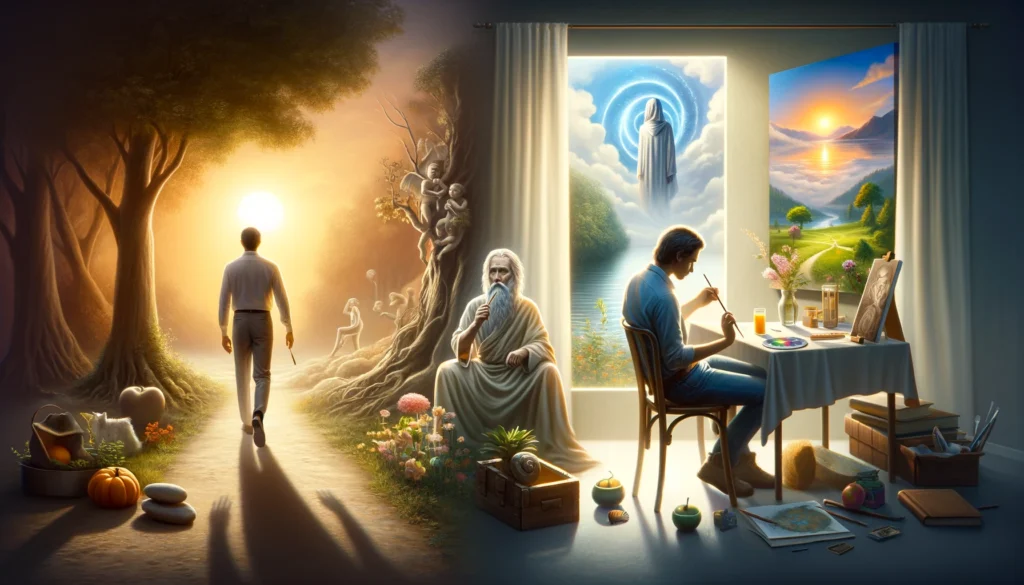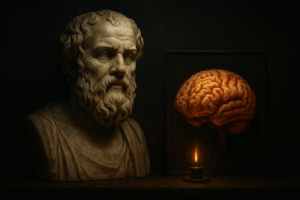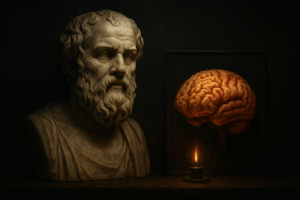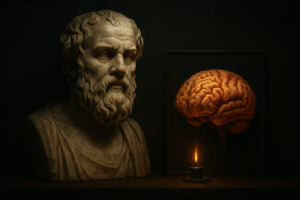
Introduction: Navigating Beyond the Shadow of Scarcity
We live in an era defined by measuring personal value through our possessions and achievements. Amplified by the omnipresence of social media and a voracious consumer culture, a continuous pressure emerges to accumulate more, fueling a cycle of dissatisfaction and insecurity. However, this simplistic view fails to recognize the inherent complexity of being human and the various aspects that make up a meaningful existence. In this context, it becomes essential to explore multidisciplinary approaches—from psychology to life philosophies, through spiritual teachings and literature—that offer us paths to understand and overcome the fear of insufficiency. “Beyond the Shadow of Scarcity” is an invitation to reflect on how to transcend the mistaken notion that having is more important than being, immersing ourselves in the rich perspectives that help us face and dispel fears of not being or having enough.
The Psychological Foundation of Sufficiency: Understanding Our Needs and Relationships
In an era where it seems we are judged by what we have or achieve, many find themselves struggling with the feeling of never being enough. This part of our article delves into how psychology helps us understand and overcome these feelings, looking at basic needs, our first affective bonds, and the way we perceive ourselves.
Understanding Our Basic Needs: Maslow’s View
Abraham Maslow, a famous psychologist, introduced us to the idea that we have different levels of needs that we seek to satisfy, from the most basic, such as food and shelter, to the desire to achieve our maximum potential. When we fail to meet these needs, we can feel anxious or insecure. For example, financial problems can make us fear not having enough to live, while the lack of close friends can make us feel that we are not good enough.
The First Bonds: The Importance of Attachment
From a young age, the way we relate to those who care for us shapes our feeling of security and self-esteem. John Bowlby and Mary Ainsworth, two important psychologists, showed that a good initial relationship helps us feel secure later in life. On the other hand, if these first bonds are not strong, we can grow up feeling less valuable and afraid of rejection.

How We See Ourselves: The Dunning-Kruger Effect
Sometimes, people overestimate what they know or can do, especially when they know little about a subject, known as the Dunning-Kruger effect. This also applies to how we see ourselves: without good self-knowledge, we can misjudge ourselves, feeling less capable than we actually are. Recognizing our true abilities can be challenging, but it is crucial to overcome the feeling of not being enough.
Connecting the Dots: Pathways to Well-Being
These ideas from psychology—our basic needs, how our first relationships affect our self-esteem, and how we perceive ourselves—provide us with a foundation to understand why we may feel inadequate. More importantly, they offer clues on how we can improve our emotional well-being, recognizing and working with these fundamental aspects of our human experience.

The Sociological Impact on the Perception of Sufficiency: Understanding Social Capital and Consumer Culture
In modern society, the way we see ourselves and how others see us is deeply influenced by two powerful sociological forces: social capital and consumer culture. These concepts help us understand how our social relationships and our consumption habits affect our sense of sufficiency and personal value.
Social Capital: The Strength of Connections
Social capital, an idea explored by thinkers like Pierre Bourdieu and Robert Putnam, highlights the invaluable worth of our networks of relationships. Bourdieu sees social capital as a resource based on the ability to maintain a network of contacts that provides us with support and advantages. Putnam, on the other hand, focuses on the trust and cooperation that arise from these relationships, strengthening the social fabric. Having a rich support network can give us a sense of security and belonging, essential for our mental and emotional health. Without this, we can feel isolated and insecure, struggling to face challenges alone.
Consumer Culture: The Endless Pursuit of More
Jean Baudrillard and other scholars of consumption observe how society is organized around acquiring and possessing. Baudrillard alerts us to the trap of consumer culture, where objects are valued not only for their utility but for the status they represent. This race for the new and better creates a vicious cycle of desire and disappointment, where “having” seems more important than “being.” Our personal value begins to be measured by what we possess, leading to constant social comparisons and chronic dissatisfaction.

Intersection and Impact
The interaction between social capital and consumer culture paints a complex picture of how we perceive our own sufficiency. While social capital can offer a path to resilience and satisfaction through authentic human relationships, consumer culture often drags us into an endless quest for external validation through material goods. This dynamic can distort our self-image and personal value, distancing us from what truly matters.
Mitigating the Fear of Insufficiency
Recognizing how these sociological forces shape our perception of sufficiency is crucial. By valuing our human connections more and questioning consumerist impulses, we can find a healthier balance and a deeper sense of contentment. Building a meaningful life goes beyond materialistic metrics; it’s about cultivating rich relationships and finding satisfaction in experiences, not just possessions.
Contemporary Implications: The Impact of Social Media and Consumer Culture
In the current digital era, social media and consumer culture emerge as dominant forces, deeply shaping our perceptions of sufficiency and personal value. This section explores how these specific elements of modern life contribute to the growing feeling of never being “enough.”

Social Media: Distorted Mirrors of Reality
Social media has transformed how we see ourselves and perceive others, often serving as distorted mirrors reflecting idealized versions of reality. The constant exposure to success stories, images of luxurious lifestyles, and highlighted achievements creates a false standard of accomplishment and happiness. This discrepancy between real life and what is presented online can intensify feelings of inadequacy and insufficiency, as people struggle to meet unattainable expectations. The constant comparison fueled by social media not only diminishes self-esteem but can also lead to an incessant quest for external validation, distancing us from genuine and authentic sources of satisfaction.
Consumer Culture: The Endless Search for Satisfaction
Simultaneously, consumer culture bombards us with the message that happiness can be bought—if we’re not satisfied, we simply don’t have enough yet. This mindset perpetuates a cycle of desire and disappointment, where each new acquisition brings only momentary satisfaction, soon replaced by longing for the next item, experience, or technological upgrade. This ceaseless pursuit of more not only fuels the economy but also digs a void within us, a void that material goods can never fully fill.
Consequences and Reflections
The interaction between social media and consumer culture creates an environment where individuals are constantly reminded of what they lack, rather than appreciating what they already possess. Over time, this can lead to a chronic state of dissatisfaction and a disconnection from the sources of joy and contentment that reside in meaningful experiences, authentic relationships, and personal growth. To counter these trends, it is essential to cultivate critical awareness of the content we consume online and the messages we internalize from consumer culture. This can include practices such as limiting time spent on social media, seeking real human connections, investing in experiences rather than objects, and most importantly, reflecting on our own definitions of success and happiness. By recognizing and questioning these contemporary influences, we can begin to redefine our perceptions of sufficiency, moving towards a more fulfilling and satisfying existence, founded not on what we have, but on who we are and how we connect with the world around us.

Life Philosophies: Pathways to Peace and Purpose
Our quest for meaning and contentment leads us to explore different life philosophies that offer unique perspectives on how to face our fears and insecurities. Stoicism and existentialism, two branches of philosophical thought, present us with valuable ways to find inner peace and purpose in our lives.
Stoicism: The Art of Living Beyond External Circumstances
Stoicism teaches us to differentiate between what is and isn’t within our control. According to the Stoics, we can manage our own actions, reactions, and attitudes, but not external events or others’ opinions. By focusing on what we can control, we can achieve ataraxia, a state of serenity.
Marcus Aurelius and Epictetus, two exponents of this philosophy, offer us practical advice on how to live according to these principles. Through their works, they highlight the importance of maintaining integrity, self-control, and an attitude of acceptance in the face of life’s vicissitudes, cultivating unshakable virtue and a peace that does not depend on circumstances.
Existentialism: Freedom and Creating Meaning in a World Without Predefined Order
Existentialism emphasizes individual freedom and the responsibility of each person to give meaning to their own existence. Jean-Paul Sartre and Albert Camus, two prominent figures of this movement, argue that although we are born without a defined purpose, we have the freedom and ability to shape our lives through the choices we make.
Sartre speaks of freedom as a burden but also as an opportunity to define who we are. Camus, facing the absurdity of existence, sees the search for meaning as an act of rebellion against the world’s inherent lack of order, a way to assert our will and our ability to find joy and purpose despite life’s uncertainties.
Convergence of Paths: Facing Insufficiency with Philosophy
Both Stoicism and existentialism offer us tools to navigate life in a more resilient and purposeful manner. While Stoicism encourages us to focus on our personal development and accept what is beyond our control, existentialism challenges us to take responsibility for our freedom, creating our own meaning in a universe that sometimes seems indifferent.
These philosophies teach us that although we may fear not being enough in the face of the world’s challenges, we have within us the capacity to find peace, purpose, and self-acceptance. They remind us that, more than external circumstances, it is our choices and our attitude towards life that define our journey in search of a full and meaningful existence.

Spiritual Teachings: Beyond Materialism in Search of Satisfaction
In our journey towards a full and meaningful life, spiritual teachings play a crucial role in guiding us beyond mere material accumulation. Christianity and Buddhism, with their distinct perspectives, offer us enriching paths to understanding true satisfaction, purpose, and inner peace.
Christianity: Trust and Spiritual Values Above the Material
At the heart of Christianity is the message to trust in divine providence and prioritize spiritual values. Passages from the New Testament, such as Matthew 6:33, encourage us to put our faith and efforts into seeking the “Kingdom of God and His righteousness,” promising that our material needs will consequently be met. This approach not only challenges us to reevaluate our relationship with material goods but also reminds us of the importance of cultivating a deep relationship with the divine.
Paul, in his words in Philippians 4:11-13, exemplifies contentment that transcends material circumstances, a satisfaction derived not from what we have, but from strength and faith in Christ. This Christian perspective teaches us that true security and joy emanate from our connection with God, not from the possessions we accumulate.
Buddhism: Liberation Through Understanding and Practice
Buddhism presents a profound analysis of human suffering (Dukkha), rooted in desire and attachment to the transient, whether material or emotional. The practice of the Noble Eightfold Path guides us to transcend this cycle of suffering through the development of a correct understanding of reality, thoughts, and actions aligned with the truth of impermanence and non-aggression.
This Buddhist path is an invitation to mindfulness, attention, and living an existence that values harmony and inner peace over the ceaseless pursuit of material gratification. It is a journey of self-discovery and enlightenment, freeing us from the chains of desire and leading us to true satisfaction.
Spiritual Convergence: Finding Satisfaction Beyond the Material
Although distinct in beliefs and practices, both Christianity and Buddhism converge on the essential quest for an existence that transcends the material. Both traditions encourage us to look inward, to develop a deeper understanding of ourselves and the world around us, and to seek satisfaction not dictated by society’s consumption patterns.
These spiritual teachings remind us that at the core of our quest for meaning and contentment lies a need to reconnect with deeper, enduring values, whether through faith in a greater force or by cultivating inner wisdom and compassion. Ultimately, both paths offer us a vision of true freedom—a freedom from the fear of insufficiency, leading us to a life marked not by what we possess, but by who we are and how we live in harmony with others and the world.

The Soul’s Mirror: Literature as a Reflection of the Human Condition
Literature, in its various forms, acts as a profound mirror of the human experience, offering unique insights into the complexity of our emotions, desires, and internal struggles. Throughout the centuries, classic and contemporary authors have woven narratives that explore the deepest dilemmas of existence, allowing us an introspection into human nature and our own lives.
Classic Novels: Exploring Human Depth
Dostoevsky, in “Crime and Punishment,” takes us on an intense journey to the heart of human morality, guilt, and redemption. His stories are stages where internal battles between good and evil unfold, reflecting the capacity for transformation and the relentless search for a purpose that transcends the merely material. This dive into the human psyche confronts us with fundamental questions about change, repentance, and the quest for meaning in a world that often appears indifferent or amoral.
Contemporary Literature: Reflections on Modern Society
Contemporary authors like Haruki Murakami, especially in works like “Norwegian Wood,” delicately address themes of love, loss, and loneliness, reflecting on the complexity of human relationships amid the consumerism and alienation of today’s society. Murakami presents characters in search of authentic connections and meaning in their lives, echoing the concerns and desires of a generation that often finds itself lost between the real and the superficial.

Conclusion: Reevaluating Our Values
This article invites us on a journey of self-knowledge and deep reflection, suggesting that by valuing “being” over “having,” we can discover a more genuine and lasting satisfaction. By exploring the disciplines of psychology, sociology, philosophy, religion, and particularly literature, we are reminded that the essence of a full and rich life transcends material accumulation.
Literature, in particular, serves as a powerful reminder of the importance of seeking purpose and true connections in a world often dominated by the incessant pursuit of more. It offers us a mirror through which we can see reflected our complexities, longings, and the possibility of finding joy and satisfaction in the deepest human experiences and the relationships we cultivate.
Thus, this article is not just an analysis but an invitation to reflect on what we truly value and how we can navigate in search of more fulfilling and meaningful lives, rooted not in what we possess, but in who we are and the authentic connections we establish.

Practical Connections: Real-Life Examples
As we navigate the complexities of modern life, facing the challenges imposed by social media, consumer culture, and the relentless pursuit of satisfaction, the theories and philosophies explored in this article come to life in unique and personal ways. Here, we present practical examples and case studies illustrating how individuals and communities are applying these insights to find balance, purpose, and genuine joy.
Overcoming Comparison on Social Media
Case Study: Ana, a 30-year-old marketing professional, discovered that spending hours on Instagram was eroding her self-esteem. Each post from friends on exotic vacations or colleagues celebrating professional promotions made her question her own value and achievements. Inspired by the principles of Stoicism, Ana decided to limit her time on social media and began focusing on what she could control: her own personal and professional growth. She also engaged in a long-standing passion for painting, finding it a source of satisfaction and joy that did not depend on external approval.
Challenging Consumer Culture
Practical Example: Carlos, a software engineer, realized he was trapped in a cycle of buying the latest technology, seeking happiness that always seemed fleeting. By adopting practices of conscious consumption and gratitude for the simple things, Carlos began to value experiences over possessions, exchanging spending on gadgets for trips with his family. This change not only improved his personal relationships but also helped him recognize the impermanence and true value of human connections, as taught by Buddhism.
Applying Spiritual Teachings in Everyday Life
Real Story: Sofia, facing an identity and purpose crisis after an unexpected layoff, turned to Christian teachings for strength and guidance. Through prayer and involvement in community activities at her church, she found a renewed sense of value that went beyond her career. This spiritual journey not only helped her overcome a difficult period but also inspired her to start a non-profit organization focused on helping the unemployed acquire new skills and find work.
Exploring Literature for Personal Reflection
Shared Experience: Juan, a university student, was deeply impacted by reading Dostoevsky’s “Crime and Punishment.” Raskolnikov’s internal struggle with issues of morality and redemption prompted Juan to intensely reflect on his own life choices and their impact on others. This led him to volunteer in social projects, seeking concrete ways to positively contribute to society.
These real-life examples demonstrate that, regardless of our individual circumstances, we have the power to apply the insights gained through psychology, sociology, philosophy, spirituality, and literature to shape more meaningful and satisfying lives. They remind us that true wealth lies not in what we have, but in who we are, the connections we cultivate, and the contributions we make to the world around us.

Guide to Action: Applying Insights in Our Life
The journey through this article invites us to deeply reflect on what we value and how we can transcend the constant pursuit of more, towards a more full and meaningful existence. To help incorporate these insights into our lives, here are some practical strategies:
Cultivating Self-Knowledge
- Daily Reflection: Dedicate a moment of your day to reflect on your experiences, feelings, and learnings. This can be done through writing in a journal or simply setting aside time for conscious thought.
- Meditation and Mindfulness: Practice meditation or mindfulness to increase your awareness of the present, helping to identify and question thought patterns that contribute to the feeling of insufficiency.
Strengthening Human Connections
- Quality Time with Loved Ones: Prioritize meaningful moments with friends and family, valuing the quality of these interactions above quantity.
- Community Engagement: Get involved in community activities or interest groups, expanding your social circle and building a sense of belonging.
Challenging Consumer Culture
- Conscious Consumption: Before making a purchase, ask yourself if it is something you truly need or if you are seeking temporary emotional satisfaction. This can help reduce compulsive buying.
- Gratitude for the Simple Things: Practice gratitude daily, recognizing and valuing what you already have, instead of focusing on what is missing.
Applying Life Philosophies
- Stoicism in Everyday Life: Reflect on the principles of Stoicism, especially accepting what we cannot control and focusing on our own behavior and attitudes.
- Creating Meaning: Inspired by existentialism, commit to personal projects, hobbies, or causes that bring meaning to your life.

Incorporating Spiritual Teachings
- Regular Spiritual Practice: If you identify with a spiritual tradition, dedicate regular time to practice, whether prayer, meditation, or studying sacred texts.
- Living the Values: Strive to live according to the spiritual values you consider most important, such as compassion, altruism, and forgiveness.
Exploring Literature
- Reflective Reading: Choose literary works that explore the deep human issues discussed in this article. Allow yourself to reflect on the stories and characters, finding parallels with your own life.
- Creative Writing: Experiment with writing your own stories or reflections, using writing as a tool to explore and express your feelings and aspirations.
Implementing these actions in your life is not a path to perfection, but a journey towards greater satisfaction and authenticity. By making conscious choices about how we live, with whom we interact, and what we value, we can begin to shape a life that truly reflects who we are and what we wish to be.

References:
This section not only properly credits the authors and thinkers cited but also provides readers with additional resources for deepening their understanding.
Maslow, A. H. (1943). A Theory of Human Motivation. Psychological Review, 50(4), 370-396. This seminal article introduces the idea of the hierarchy of needs, fundamental for understanding human motivation.
Bowlby, J. (1969). Attachment and Loss, Vol. 1: Attachment. New York: Basic Books. Bowlby explores the importance of early relationships in forming the basis of emotional security.
Ainsworth, M. D. S., Blehar, M. C., Waters, E., & Wall, S. (1978). Patterns of Attachment: A Psychological Study of the Strange Situation. Hillsdale, NJ: Erlbaum. This work expands Bowlby’s attachment theory, introducing the concept of attachment styles.
Kruger, J., & Dunning, D. (1999). Unskilled and unaware of it: How difficulties in recognizing one’s own incompetence lead to inflated self-assessments. Journal of Personality and Social Psychology, 77(6), 1121-1134. This study introduces the Dunning-Kruger effect, explaining how a lack of competence can inflate self-assessment.
Bourdieu, P. (1986). The forms of capital. In J. G. Richardson (Ed.), Handbook of Theory and Research for the Sociology of Education (pp. 241-258). New York: Greenwood. Bourdieu discusses the concept of social capital and its importance in social relationships.
Putnam, R. D. (2000). Bowling Alone: The Collapse and Revival of American Community. New York: Simon & Schuster. Putnam examines the decline of social capital in the US and its implications for society.
Baudrillard, J. (1998). The Consumer Society: Myths and Structures. London: Sage. Baudrillard analyzes consumer culture and its impact on identity and society.
Dostoevsky, F. (1866). Crime and Punishment. This classic novel explores themes of morality, guilt, and redemption.
Murakami, H. (1987). Norwegian Wood. This contemporary novel addresses themes of love, loss, and loneliness in the context of modern society.
Aurelius, M. (180 A.D.). Meditations. This Stoic philosophy text offers reflections on virtue, self-control, and acceptance.
Epictetus. (135 A.D.). Enchiridion. A manual of Stoic teachings focused on control over one’s reactions and attitudes.
Sartre, J.-P. (1943). Being and Nothingness. Paris: Gallimard. Sartre explores the concept of freedom and the responsibility in creating one’s own meaning.
Camus, A. (1942). The Myth of Sisyphus. Paris: Gallimard. Camus discusses the search for meaning in an absurd world.





